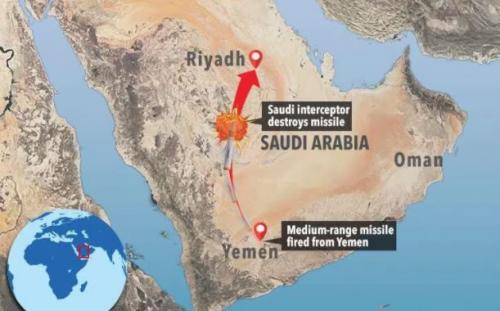 The Saudi-led coalition fighting Yemen’s Shiite rebels said it intercepted a missile fired over southern Riyadh on Tuesday, which the rebels said was targeting the royal palace in the kingdom’s capital.
The Saudi-led coalition fighting Yemen’s Shiite rebels said it intercepted a missile fired over southern Riyadh on Tuesday, which the rebels said was targeting the royal palace in the kingdom’s capital.
It was the second time in as many months that a rebel projectile had reached as far inside the kingdom as Riyadh.
The Yemeni rebels said they launched a ballistic missile to target Yamama Palace in Riyadh, where King Salman chairs weekly government meetings and receives dignitaries and heads of state from around the world.
The coalition statement, carried by Saudi state TV, said the missile was fired by the rebels, known as Houthis. State TV said no damage was caused by the intercepted missile.
Residents of Riyadh posted videos on social media showing a small cloud of smoke in the sky after hearing a loud explosion.
In Yemen, Houthi spokesman Mohammed Abdul-Salam said the group targeted the Yamama Palace. He tweeted that a ballistic “Volcano H-2” missile was used in the attack.
On Nov. 4, the Houthis targeted Saudi Arabia’s international airport in Riyadh, and Saudi Air Defense said it was intercepted. However, a New York Times analysis of photos and videos from the attack suggested air defenses may have missed the projectile and that the warhead struck near its intended target.
Saudi Arabia has the U.S.-made Patriot surface-to-air anti-missile system, which President Donald Trump credited for bringing the Nov. 4 missile down.
In the almost three years that the Saudi-led coalition has waged war with Yemen’s rebels, dozens of other missiles have been fired by the Houthis across the border into Saudi Arabia, reaching as far as some border towns. There have been casualties among local residents in those attacks.
Earlier this month, the Houthis claimed they fired a missile at an under-construction nuclear plant in the United Arab Emirates, which is part of the Saudi coalition. The UAE, however, denied that a missile had been fired.
The Saudi-led coalition has been at war with the Houthis since March 2015. The Houthis, who are allied with Saudi Arabia’s rival, Iran, have forced into exile the Saudi-backed and internationally recognized government of President Abed Rabbo Mansour Hadi.
Despite a fierce air campaign against the Houthis, the rebels still control the Yemeni capital, Sanaa, and much of the country’s north along the border with Saudi Arabia.
Iran made missiles
The United States last Thursday presented pieces of what it said was the missile fired last November at Saudi Arabia by Houthi militia in Yemen, describing it as conclusive evidence of Iran involvement and its violation of UN resolutions.
Iran has denied supplying the Houthis with such weaponry.
“The U.S. has long believed that Iran is providing weaponry to proxies and partners and militias throughout the region, and what we have here to show you today is proof,” said Pentagon spokeswoman Laura Seal, adding Saudi Arabia and the United Arab Emirates had recovered the arms and loaned them to Washington.
Under a U.N. resolution that enshrines the Iran nuclear deal with world powers, Tehran is prohibited from supplying, selling or transferring weapons outside the country unless approved in advance by the U.N. Security Council. A separate U.N. resolution on Yemen bans the supply of weapons to Houthi leader Abdul-Malik al-Houthi and others.
Associated Press

Leave a Reply
You must be logged in to post a comment.